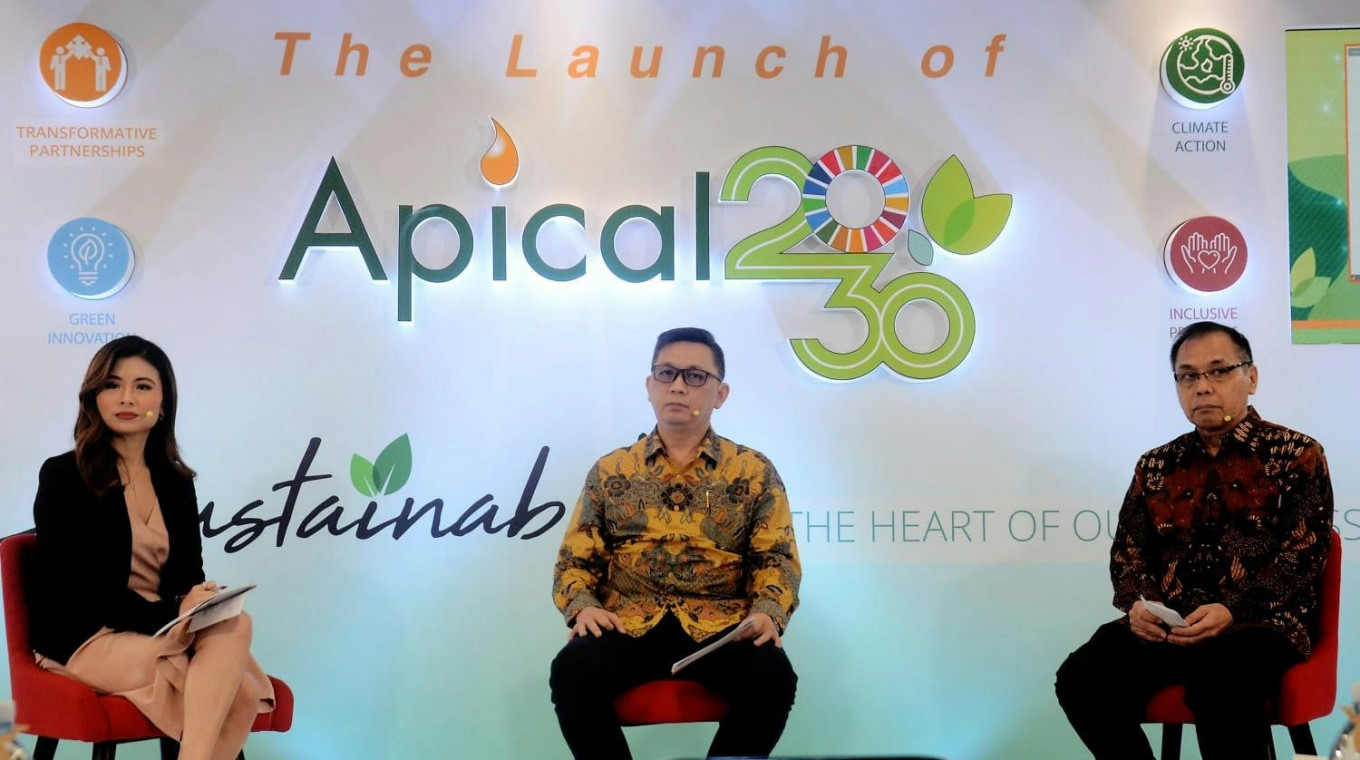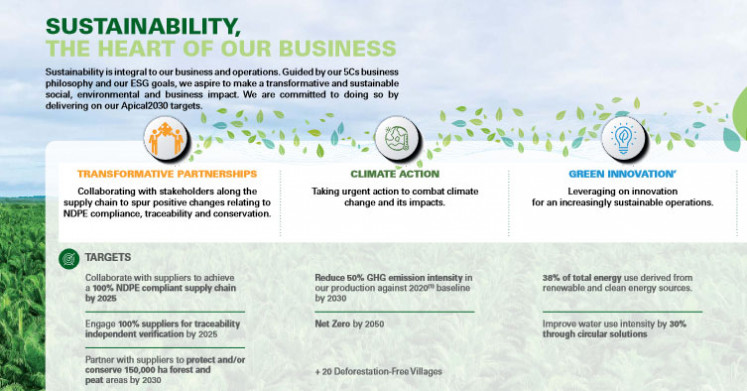Popular Reads
Top Results
Can't find what you're looking for?
View all search resultsPopular Reads
Top Results
Can't find what you're looking for?
View all search resultsApical aims for sustainability with launch of Apical2030 strategy
Change text size
Gift Premium Articles
to Anyone
T
he leading global palm oil producer, Apical Group, has launched Apical2030, a strategic initiative aimed to advance its commitment to environmental and operational sustainability.
Taking an inclusive approach and guided by a sequential roadmap for greater accountability and impact, Apical2030 is the driver behind the group’s efforts to build a more sustainable and responsible supply chain while addressing present-day Environmental, Social and Governance (ESG) challenges.
Apical Group president Dato’ Yeo How said the initiative centered on creating positive impacts for society, the environment and businesses.
“With aspiring sustainability-focused targets, we are committed to living up to our business philosophy of doing what’s right for the community, country, climate and customers. Only then will it be good for our company,” Dato’ Yeo said in a statement.
Consisting of 10 commitments across the four strategic pillars of Transformative Partnerships, Climate Action, Green Innovation and Inclusive Progress, the initiative’s targets are closely linked to the group’s 5Cs business philosophy, ESG goals and nine priority Sustainable Development Goals (SDGs).
The Transformative Partnerships pillar covers four targets that involve collaborating with stakeholders and suppliers along the supply chain to spur positive change. The targets are: to achieve a supply chain compliant with 100 percent No Deforestation, No Peat and No Exploitation (NDPE) by 2025; to engage 100 percent of suppliers for traceability independent verification by 2025; to promote clean energy through 20 biogas plants; and to protect and/or conserve 150,000 hectares of forests and peatlands within Apical Sourcing Areas by 2030.
The Climate Action pillar aims to take urgent action in combating climate change and its impacts by realizing two targets: reduce 50 percent of greenhouse gas (GHG) emissions from Apical production against the group’s 2020 baseline by 2030, and achieve net zero by 2050.
The Green Innovation pillar aims to leverage innovation for increasingly sustainable operations to derive 38 percent of total energy use from renewable and clean energy sources and to improve total water use by 30 percent through circular solutions.
The fourth pillar of Inclusive Progress aims to empower communities and improve livelihoods through tailored initiatives. Apical is committed to supporting communities within the group’s landscape and value chain through the development of 30 Sustainable Living Villages (SLV) by 2030 and certifying 5,000 independent smallholders by 2030. The SLV program also covers other efforts such as planning, building and modifying prior schemes to promote sustainable living across the group’s human, social, economic and environmental commitments.
“Building a more sustainable and responsible supply chain requires the commitment and collective effort of all parties, including industry partners, palm oil companies, independent smallholders and NGOs, among many others,” Dato’ Yeo underlined.
Approximately one-third of the world’s supply of edible oils comes from palm oil, of which 40 percent is produced by smallholders. In Indonesia, smallholders contribute 45 percent of the nation’s palm oil output.
Apical has rolled out various initiatives over the years that, together with Apical2030, it intends to strive toward greater traceability, NDPE compliance and a sustainable palm oil supply chain.
Among the group’s many programs are the Traceability Outreach Programme (TOP) to provide suppliers with simplified traceability solutions, the Smallholder Inclusion for Better Livelihood & Empowerment (SMILE) Programme to help independent smallholders in Indonesia improve their yields, acquire international certification and secure sales premiums, and Sustainability Assurance & Innovation Alliance (SUSTAIN), a palm oil alliance blockchain solution to improve traceability to palm oil production areas and accelerate the implementation of NDPE policies across complex supply chains.
Remarking on the group’s journey to Apical2030, executive director Pratheepan Karunagaran noted that Apical recognized the imminent challenges facing the climate, the environment and communities.
“As a business with a global footprint, we understand our contribution and the important role we play in the markets we operate in. As such, our efforts and sustainability targets are also intended to support national ESG agendas,” he said.
Apical2030 builds on the group’s existing efforts while expanding on its ambitious sustainability targets for transformative and sustainable change in the palm oil industry.
The group embarked on its comprehensive approach to building a transparent, traceable and sustainable palm oil supply chain in 201 with the development and release of its Sustainability Policy and has been publishing its annual Sustainability Report since 2016. In 2020, it rolled out the Apical Sustainability Implementation (A-SIMPLE) Framework, a mechanism to ensure the effective implementation of its landmark Sustainability Policy.
In October 2021, Apical secured its first sustainability-linked loan (SLL) totaling US$750 million from a syndicate of 17 lenders. The loan, which is rapidly gaining uptake, will be used to finance the group’s working capital and capital expenditure needs.
According to Karunagaran, SLLs are also drivers of positive ESG change, as borrowers are able to enjoy real economic benefits through financial incentives when they meet the ESG targets.
SLL proceeds can be used for corporate purposes if the borrower meets a set of predetermined sustainability targets, and the borrower’s performance determines whether it receives lower rates or incurs penalties.
Assessed annually, the predetermined targets are in line with Apical's commitment to ensure a sustainable supply chain.
“It’s clear that the commitment and collective effort of all parties are needed for a more sustainable and responsible supply chain. We are certain that the time-bound sustainable roadmap we’ve set for Apical2030 will enable us to commit to meaningful actions for a lasting impact,” Karunagaran emphasized.
Apical Group was recently bestowed a Gold award for “Asia’s Best Supply Chain Reporting 2021” at the Asia Sustainability Reporting Awards (ASRA) in early April. In addition, the Group was ranked second for most transparent global palm oil company in the 2021 palm oil assessments company selection of SPOTT (Sustainable Palm Oil Transparency Toolkit)
Apical2030 will guide the group’s decisions and actions with the aim of achieving sustainable growth and creating value for all of the group’s stakeholders while simultaneously protecting the planet.













